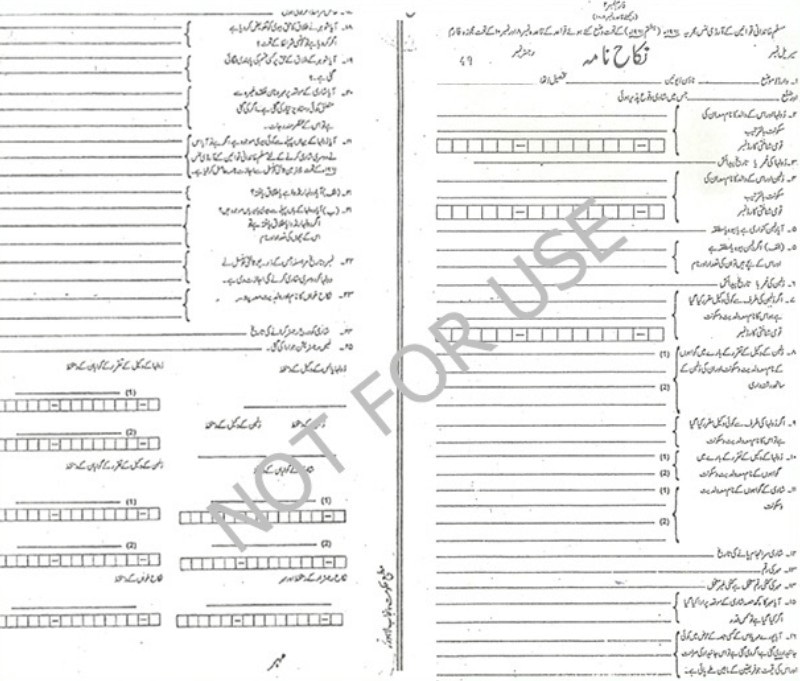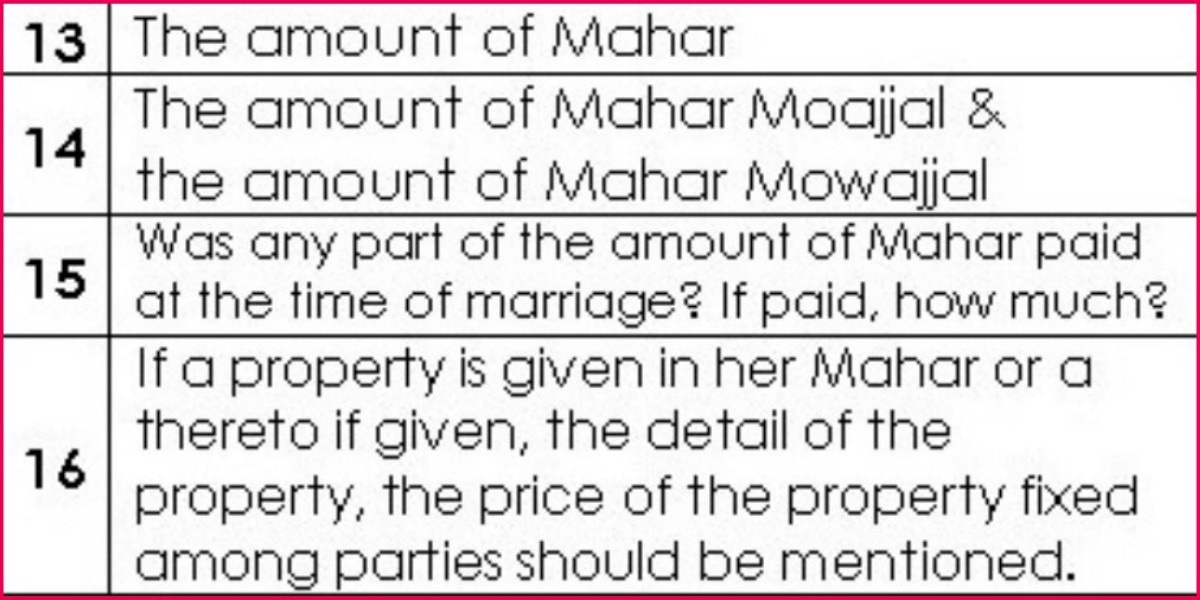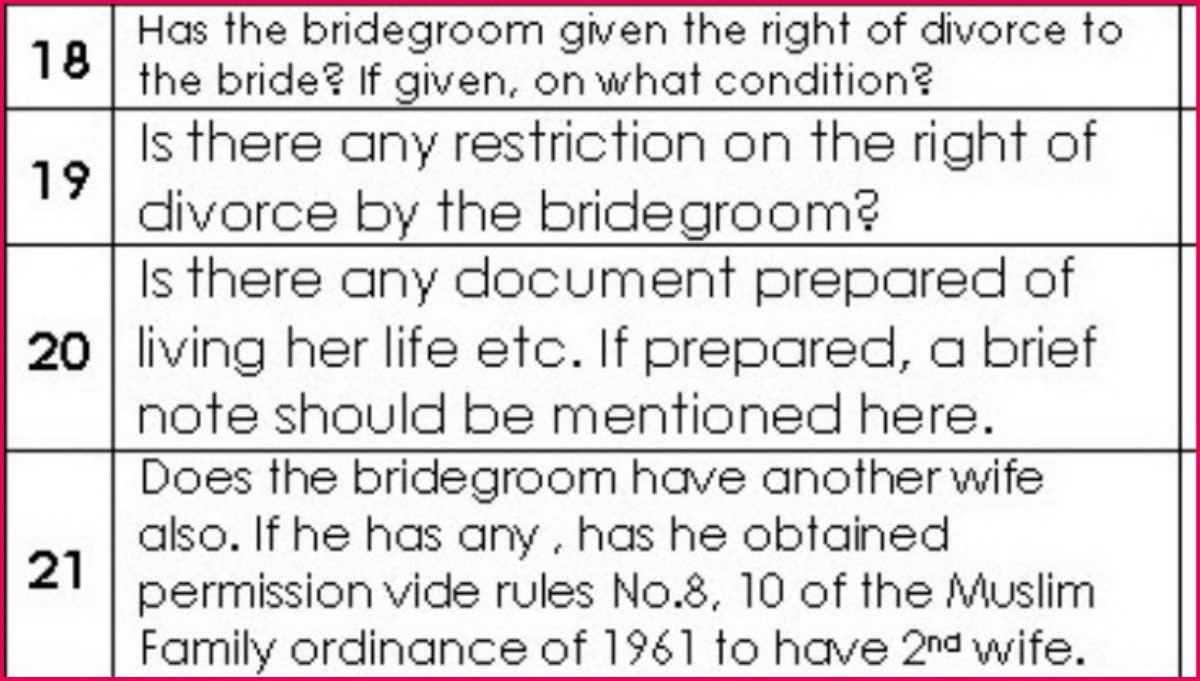Marriage is seen as a beautiful promise of ’till death do us part’ by both the couples and their families. We often see people from other faiths discussing their marriage contracts at length, until both the groom and the bride are satisfied. In comparison, Muslim brides in Pakistan usually are not aware of what they are putting their signature on.
Women, its high time that you realize that Islam has given you rights when it comes to marriage. And the first thing you need to do before getting married is to give your Nikahnamas (marriage contracts) a thorough read. We will explain why.
Don’t Let Doubt Fill Your Heart
In a desi society such as ours, it has often been observed that a woman asking to see her nikahnama clauses and asking for changes to them might be seen as a sign of disrespect.
Usually these women face remarks like does she not trust the love of her life? Instead of making women feel guilty for demanding their rights, we believe they should be trusted to make sane and just decisions. Co-dependence might be an alien concept for most boomers, but it is really important especially when signing a legal document. We’ll tell you exactly why.
Laying Down The Foundations
What do you do when you start your own business? You jot down all the nitty-gritty details that lay down the foundation of your venture. Not only will it help you in maintaining your business in the long-term, if followed correctly, it will determine the business’s future success.
Marriage might not be a business deal but it is a legal contract that binds two parties together. The more sound, detailed and just the contract, the more likely it will be for a couple to spend a lifetime together.
The nikahnama is a written document that two Muslim partners entering into a civil union must put their signature on. This serves as a legal document for their marriage. Under the Muslim Family Laws Ordinance 1961, this document lays out the rights and obligations agreed upon the by the bride and groom.
No matter how strong your bond is before marriage, there’s a chance it may not work out in the future. Stats from the Family Court of Karachi show that 40% of marriages ended in a divorce in 2017.
If those were the odds of losing your life upon eating an unwashed fruit, we’d always double-check. So, why are we so blatantly ignorant when it comes to marriage?
ALSO READ
Omair Rana’s Wife Tells Us How It Feels Like Marrying Your Best Friend
The Role of Religious Clerics
The nikahnama is basically a civil contract, so much so that the presence of a religious cleric is not even obligatory. But because of cultural norms, they are there to officiate your marriage.
Reports state that some of these imams end up removing sections of the nikahnama that deal with a woman’s rights. This is done either by their own selves or due to insistence of the patriarchy.
It is a good idea to go through your nikahnama yourself, because its a life-changing decision.
Clauses To Look Out For
While clauses 1 till 12 are very basic and are filled out like any other form, here are a few clauses that need your undivided attention and consideration.
Questions About Mehr
Clauses 13-16 include questions about Mehr, which is a gift, financial or otherwise, given by the groom to the bride.
It is an obligation and even if the wife waives it off, that won’t result in the expulsion of the requirement.
It is a girl’s right and it might come in handy in case you are filing for divorce. The Mehr is to be given on demand.
ALSO READ
Amir Liaquat Wishes Prime Minister Imran Khan A Happy Wedding Anniversary
The ‘Special Conditions’ section deserves a look
Clause 17 is a Special Conditions section where you can include anything from monthly allowance to a breakdown of the daily chores. In fact, this section also allows brides to mention if they want to pursue a career after marriage.
This helps manage expectations and allows both parties to be on the same level.
Delegate the Right to Divorce
A woman can be given the right to divorce her husband without having to go to the court to file for khula. This right is handed over by the groom. Khula sounds like a necessary evil, but there is a way around it and not many women are aware of it.
It is usually eliminated from the nikahnama, because a khula ensures that the wife can’t demand her rightful mehr or any sort of financial help.
Concluding Thoughts
Signing a well articulated nikahnama is an important step. It ensures that if certain terms and conditions laid down in it are not honored, the partner does have some standing to seek relief from the courts.
Did you know about these clauses at the time of your nikah? Let us know!












Great
Thought provoking article.
I suggest that every couple should understand it before signing it blindly.
This is a great and practical initiative to help young men and women understand about taking and giving rights and responsibilities to each other in marriage and practical life!